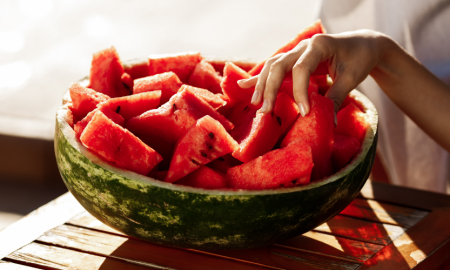
How Our Brain Reacts to Food: The Psychology of Eating for Pleasure

Food is one of the few things that can evoke emotions in almost everyone. It can make us happy, nostalgic, guilty, or even sad. This poses the following questions: While we all need food to survive, why do we sometimes crave unhealthy options with no nutritional value? Why do we eat for pleasure even if it can lead to weight gain or health issues? The answer lies in the psychology behind our food choices.
In this blog post, we will explore the reasons why we eat for pleasure, how our brain reacts to food, and why it is essential to understand the psychology behind our food choices.

Jamie / Unsplash / Turns out that the logic lies in our food choices.
Why Do We Eat for Pleasure?
Eating for pleasure is sometimes referred to as “emotional eating” or “hedonic eating.” essentially, it involves eating food not because we need it but because we enjoy it. According to research, there are many reasons why we indulge in pleasure eating. These include stress, boredom, social gatherings, and even genetics.
For example, studies show that people who experience high levels of stress are more likely to eat for pleasure. Why? Well, they seek comfort and pleasure. Similarly, people who grew up in households where food was used as a reward or punishment are more likely to indulge in pleasurable eating.
How Our Brain Reacts to Food
Our brain plays a crucial role in how we perceive and experience food. When we see, smell, or taste food, our brain releases chemicals such as dopamine and serotonin, which are responsible for making us feel good. These chemicals create a sense of pleasure and reward, which can make us crave more food.

Nathan / Pexels / One of the main reasons for pleasurable eating is a lack of mental stability.
For instance, studies find that people who eat chocolate see a significant increase in the levels of endorphins, the neurotransmitters responsible for creating a sense of pleasure. This suggests that our brain is wired to seek pleasure. In turn, this can lead to overeating or indulging in unhealthy food options.
Why It Is Important to Understand the Psychology of Eating
Understanding the psychology behind our food choices is crucial for maintaining healthy eating habits. By recognizing the reasons why we eat for pleasure, we can take steps to control our cravings and make healthier food choices. For example, if we know that stress triggers our pleasure eating, we can find alternative ways to manage stress, such as exercise or meditation.
Similarly, by understanding how our brain reacts to food, we can avoid overeating and make conscious choices about the food we consume. This can help us maintain a healthy weight and reduce the risks of developing health issues. Be it obesity, heart disease, or diabetes.

Askar / Pexels / If we understand the psychology of eating, we will be more conscious of what we consume on a daily basis.
Tips For Managing Pleasurable Eating
While eating for pleasure is a common behavior, it does not have to be a negative one. Here are some tips for managing pleasure eating:
Practice Mindful Eating
Pay attention to your hunger cues and eat slowly, savoring each bite. This can help you enjoy your food while avoiding overeating.
Find Alternative Ways to Manage Emotions
Instead of turning to food when you are stressed or bored, find healthier ways to manage those emotions. These could be such as exercise, reading, or spending time with loved ones.
Make Smart Food Choices
Choose foods that are both healthy and enjoyable–for example, fruits, vegetables, nuts, and whole grains.
Practice Moderation
It is okay to indulge in pleasure eating once in a while. But try to maintain a balanced and varied diet.
More in Diet
-
`
Are Mono Diets Worth It – or Just a Dangerous Trend?
As summer brings on the pressure to slim down fast, the internet lights up with diet trends promising instant results. One...
August 3, 2025 -
`
Why Motivation Is Essential for Sustainable Fitness Success
Motivation isn’t something that shows up when it’s convenient—it’s something that needs to be built, shaped, and sustained. Many people struggling...
July 27, 2025 -
`
The Mystery of Human Body Parts That Science Still Can’t Solve
The human body is a patchwork of evolutionary choices, quirks, and mysteries. From skeletal structure to the tiniest gland, everything tells...
July 18, 2025 -
`
Why a Mediterranean Diet and Exercise Slow Bone Loss in Seniors
Bone health isn’t just a concern for the elderly—it’s something that starts to matter the moment the body begins to lose...
July 12, 2025 -
`
Want Better Memory? This Diet Could Help Keep Your Brain Sharp
Losing focus, memory lapses, or slower thinking—these aren’t just normal parts of aging. While cognitive changes do happen over time, lifestyle...
July 5, 2025 -
`
The Truth About Health Tracking Apps and Their Impact on Wellness
Scroll through social media or browse the App Store, and you’ll likely spot dozens of health tracking apps. They promise everything—from...
June 29, 2025 -
`
New Study Reveals Alzheimer’s Affects the Entire Body
Most people associate Alzheimer’s with memory loss and cognitive decline, assuming its impact stays confined to the brain. But new findings...
June 21, 2025 -
`
The One Simple Habit Mark Cuban Credits for His Success
Success doesn’t come from shortcuts or luck—it’s built on habits that stand the test of time. Mark Cuban, the outspoken billionaire,...
June 14, 2025 -
`
Thinking of a Detox Diet? Read This Before You Start
Detox diets continue to be one of the most talked-about trends in the wellness space. Whether it’s juice cleanses, tea plans,...
June 8, 2025









You must be logged in to post a comment Login